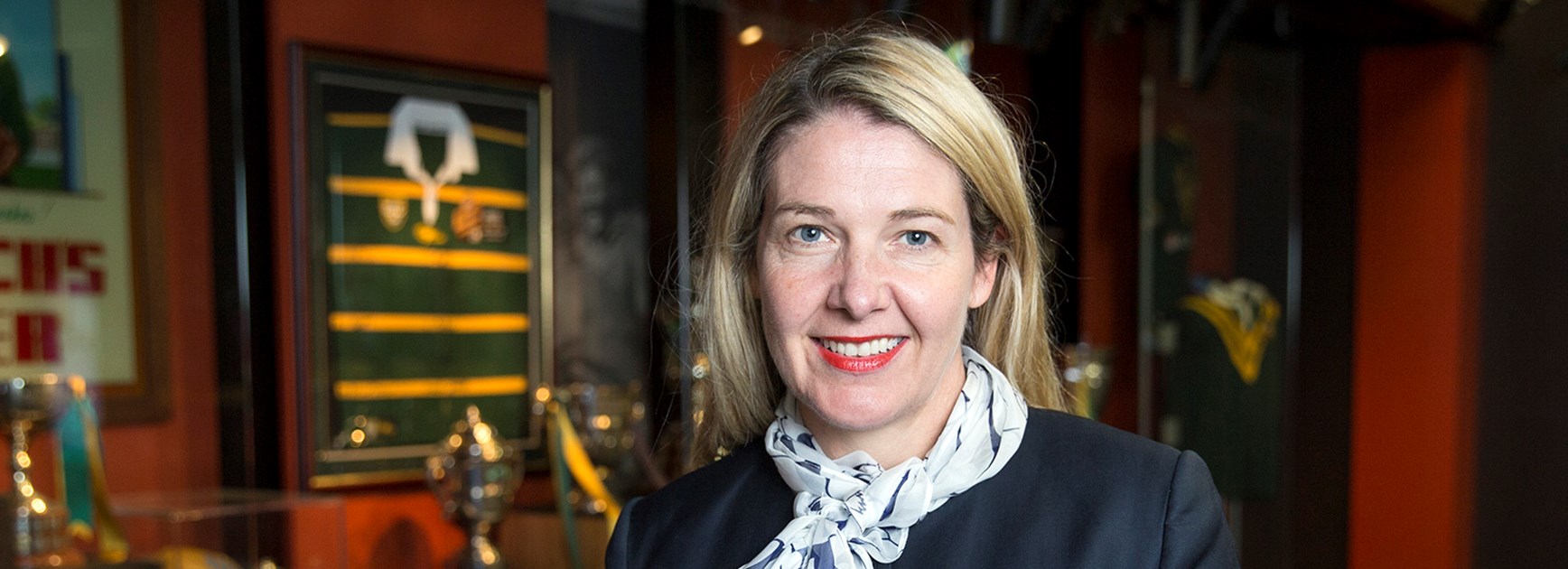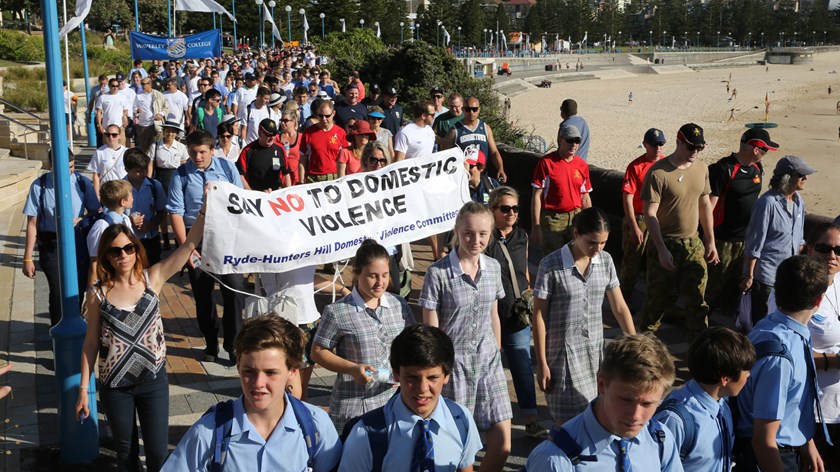
On the eve of White Ribbon Day, NRL Chief Operating Officer Suzanne Young sat down to provide a personal account and reflection on what White Ribbon Day means to her, together with discussing the current state of domestic violence and rugby league's responsibility and voice in helping change behaviours in the game and amongst communities.
Suzanne is a passionate advocate for women in sport and during the course of her first year at the NRL, has established the Women In League mentoring program – celebrating and acknowledging the role of women at all levels and in all areas of the game.
Suzanne will be one of thousands walking tomorrow and taking the White Ribbon oath – to stand up, speak out and act to prevent men's violence against women.
You can support Suzanne and communities far and wide by taking the White Ribbon oath and learning more at whiteribbon.org.au
Suzanne Young: The importance of White Ribbon Day
Role models are important
I agree with the comments of our Defence Minister, Marise Payne, who said that it's important for young women and girls to see female role models in a variety of roles and also in powerful roles. We need to make it normal to see women in big roles, so it becomes normal, not unusual and therefore immediately suspicious.
Gender equality needs to become normal, not just because our current regime of inequality is unfair, but also because we are depriving Australia of precious talent and it is also costing lives.
Both our Prime Minister Malcolm Turnbull and Elizabeth Broderick, the former sex discrimination commissioner, have pointed out that violence against women is both "a cause and a consequence of gender inequality". The evidence shows that the rates of violence against women are lower in countries where women achieve greater equality with men.
One is one too many
When I sat down to start this article last Sunday, just three days ago, there had been 77 women killed in Australia this year. That number is now 78. We know this because Destroy The Joint and Counting Dead Women Australia researchers track how many women have been killed this year. Last year it was 84. One is one too many.
End all violence. Full stop.
When I talk about this topic, I sometimes hear "but what about the women who are violent towards men?" I don't condone violence full stop, but the reality is that Australian police and court crime data indicates that women constitute a significant proportion of reported victims of intimate partner violence, while men make up a significant proportion of reported abusers. Australian population survey data similarly show that women were more likely than men to be victims of physical, sexual and other forms of violence by a partner.
So what is domestic violence? It is generally understood as gendered violence, and is an abuse of power within a relationship (heterosexual or homosexual) or after separation. In the large majority of cases, the offender is male and the victim is female. Domestic violence comes in many forms. It is not just physical violence and all forms do damage. Social isolation, verbal abuse, emotional abuse, sexual abuse, economic abuse, spiritual abuse are all forms of domestic violence.
Domestic violence doesn't discriminate. It could happen to your sister, your mother, your daughter, your cousin, your friend. Unfortunately the stigma attached to domestic violence means it can be hidden. It can be seen a private matter, but domestic violence is very much a public matter that impacts our communities and importantly our children's lives. Women in Australia are three times more likely than men to experience violence. When men experience violence in Australia, nearly three quarters is at hands of other men.
You will have heard the facts. One woman per week dies from violence at the hands of a current or former partner. One in three women have experienced physical violence since age 15, one in four experience emotional abuse and 1 in 5 sexual violence. Where kids are involved, half of them have seen or heard the domestic abuse.
When I see reports of domestic violence and the death of women and men at the hands of partners or ex-partners, I wonder what the solution is. It can't be that leaving is the only long term option.
Part of it needs to be in creating a society in which men see women as true equals and we need good men to stand up and never commit, excuse or remain silent about violence against women. Make a pledge and become a White Ribbon ambassador. Do it. Tell others about it. Lead the way.

Our stance
Part of the reason I took on the job as the Chief Operating Officer of the NRL was because of our strong stance on domestic violence. We work with NRL Clubs to ensure that any player convicted of domestic violence is suspended from the game for a considerable period. Since I joined the NRL, that has resulted in playing bans of at least nine months for a first offence and the likelihood is that a second offence will be met by a permanent ban. But the NRL is not a court of law and if a player pleads not guilty to a charge of domestic violence, we will almost always abide by the law and the premise of not guilty until he is proven so.
But I know there are people who think we don't take domestic violence seriously and that we, and particularly our players, should be held to a higher level of accountability than others because they are "sporting heroes". It is vexing. I question whether we are doing the right thing, knowing that 64 per cent of women don't report physical assault and 81 per cent don't report sexual assault to the police. Many who suffer domestic violence never go to the police to ask for help. But if someone says they are innocent, aren't they entitled to that as a presumption?
Our stance may mean that a player is ultimately found guilty and still gets to play football, until the court process is complete, but the alternative is that an innocent player could be stood down for the duration of the court process.
My hope
I hope to see and will advocate for clubs to become White Ribbon accredited workplaces, for club boards, the NRL executive and players to become White Ribbon ambassadors and for the game's leaders to continue to publically denounce violence against women and privately work with those in the rugby league family to get the support they need to be role models for safe lives for everyone – women, children and men.
Rugby league is not perfect. We are a reflection of society and domestic violence is a society-wide issue. But we have and we will continue to work with experts in this field to do what we can to make Australia a more equal, more inclusive and safer place for everyone.
The best of us
When I was at boarding school, my headmaster Mr Todd told us that "we would be judged by the behaviour of the worst of us, not the best". Unfortunately it is true and it is easy to pre-judge an entire sporting code or playing group by the unfortunate examples set by a few.
But I have seen the impact of the work done by the likes of Alan Tongue, who captained the Canberra Raiders and played more than 200 NRL games. He runs a voice against violence school program which uses rugby league to teach children about inclusiveness and share the message of diversity.
Another of my favourites is Anthony Minichiello, aka 'Mini', who earlier this year helped launch a "Dads Read" program to encourage dads to read to their children for just 10 minutes a day to help improve their literacy. Mini is just one example of hundreds of past and present players who spend more than 35,000 hours working tirelessly across the country to build stronger communities.
The work that we do with players during their playing days sets them up for success in their post playing career. Every NRL club has a Career Coach on staff to help players plan for life after sport and more than four in five NRL and NYC players are engaged in further education or workplace training, with our under-20s National Youth Competition players required to work and/or study for at least 24 hours per week to be eligible to play.
In 2015, through our NRL Graduates of League, a higher education support program which provides mentoring, peer tuition and financial support to our players, we saw more than 200 players at more than 30 universities studying degrees including Commerce, Social Sciences and Health Sciences, to Engineering, Law and Education. Pass rates average at approximately 87 per cent, which is higher than the national average, and close to a quarter of these players identify as Pasifika or Indigenous. The NRL through these programs is leading the way.
A year on
It is just over a year since I started at the NRL and I look back and reflect on how much I have learned and more importantly the wonderful people I have had the good fortune to meet and work with. Rugby league is full of good people who do and who want to make a difference. As a leadership team, we are focused on making our game safer, more exciting, more inclusive and more appealing. It has been a busy and rewarding year as I have talked with, listened to and debated issues and ideas across a broad set of stakeholders.
Rugby league makes a real difference to people's lives, and I'm proud to be making a contribution to rugby league. We are determined to be a bigger and more professionally run sport. We will continue use our profile and reach to create meaningful social outcomes in people's lives and ensure rugby league is a place where everybody belongs.
